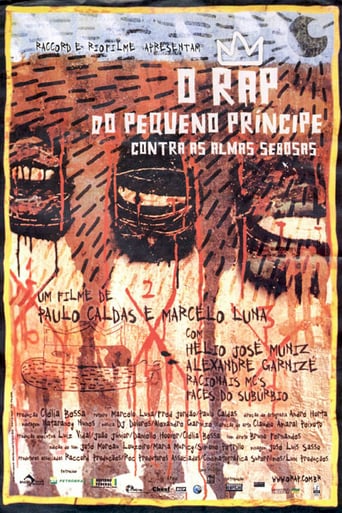



Clever and entertaining enough to recommend even to members of the 1%
View MoreAll of these films share one commonality, that being a kind of emotional center that humanizes a cast of monsters.
View MoreOne of the best movies of the year! Incredible from the beginning to the end.
View MoreGreat movie. Not sure what people expected but I found it highly entertaining.
View MoreBy night Recife looks like an attractive city. The documentary "The Little Prince's Rap Against the Wicked Souls" begins with a montage sequence of Recife at night. However, by day, we soon learn, Recife is crime ridden. At one point one of the subjects of the film tells us that it is statistically the fourth worst city in the world to live in. The film focuses on two young male inhabitants of Recife who have both reacted strongly to their situation. One has become a drummer in a rap/rock band. The other has killed forty-four people and is now in jail. Both use the term "Wicked Souls" to describe their enemies. Little Prince's Rap Against the Wicked Souls is a fascinating study of how people view the world they live in, and how they react to it. Helio Jose Muniz Filho, 21, is the vigilante nicknamed "Little Prince". He is actually quite articulate, and you can see that he really believes he did the right thing by killing all those people. He recounts how he became a vigilante, accidentally killing his first victim in a gang fight. Word got around and before he knew it friends of the deceased were looking for revenge. He had to kill them too. After that he had found his solution to the crime problem in Recife. He killed at least forty four times before he was caught. He admits it and never shows regret, but never gloats either. He has is own posse, who are interviewed wearing caps and bandanas over their faces. They are not nearly as articulate and come across as buffoons as they relate how they are influenced by Steven Segal films, and how they used to "pop" strangers in the street just because by the clothes they wore they looked like criminals. They no longer do that because as one of them states, "the criminals are getting smart. Now they dress sharper than businessmen!" Jose Alexandre Santos de Oliveira, 27, is the drummer in a rising band called Faces do Suburbio. De Oliveira was attracted to drumming because, as he puts it: "percussion is basic. It's the foundation, like education." Indeed, de Oliveira seems to be the exact opposite of Filho. De Oliveira is a pacifist, and believes in solving problem through education and understanding. Although he is a pacifist, his music is anything but passive. Aggressive and fervently leftist, Faces do Suburbio could be called the Brazilian Rage Against the Machine. De Oliveira is very clear in the goals of the band: to educate the people through music. He wants to use his music to express how real life is. "Very few bands do that in Brazil," he says "you could count them on your fingers." An interesting point about de Oliveira is how he, although by no means supports what Filho has done, does not judge him. De Oliveira perfectly understands how the hard life of Recife can drive a man to extremes. The key is to channel your anger into something positive.Structurally, the film jumps back and forth between our two main subjects. We also hear from people on both sides of the vigilante issue, including Filho's mother. There is no "story" (say, in a documentary like "The Thin Blue Line"), but the film does build up a certain tension. When the subjects introduces themselves we have no idea who they are. We quickly learn about the killings and the music, but more and more layers are built as the film progresses. At on point we find out that hundreds of people have signed a petition in the hopes of freeing Filho. They believe him to be a hero. Only at the end is it revealed that Filho and de Oliveira are actually close friends. Aesthetically, the film is incredibly exciting. Long takes of the camera whipping through the city streets combine with rapid montage to illustrate not only the energy of the rap music, but also the confusion and anger that the characters must feel. The film to me is a lot more successful at depicting the horrors of urban living than say, "Central Station", not because it is a documentary, but because it dares to be gritty and not to sentimentalize its points. I realize as I conclude, that this is the only Brazilian documentary I have ever seen (I don't include Bananas is my Business, to me it is about Brazil only). The film takes chances in structure and aesthetics than I haven't seen in a Brazilian film since the Cinema Novo film of the 60's and 70's. It is unfortunate that more Brazilian documentaries are not available. This is some incredible work that needs to be seen.
View More